I’ve only had a chance to scan some news surveys of the WikiLeaks diplomatic cables dump. And my first reaction was similar to watching a “making of” clip at the end of a movie: Everyone knows that diplomacy is a staged event that often requires the willing suspension of disbelief. That’s why we balance the official version offered by government spokespeople with off-the-record comments and tick-tock accounts describing what goes on behind the scenes. And the WikiLeaks diplomatic cables are a motherlode of behind-the-scenes accounts. To say that one version of the events is more important than the other, or […]
Global Archive
Free Newsletter
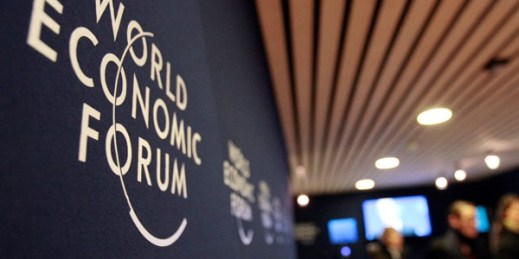
Editor’s note: The following article is one of 30 that we’ve selected from our archives to celebrate World Politics Review’s 15th anniversary. You can find the full collection here. Globalization holds out the prospect that the world might become a single place, but the resulting integration is often perceived as increased sameness through new information technologies and the spread of consumer culture. In this vision, whether defined as cultural imperialism, Americanization, or the triumph of market capitalism, global culture tends to be seen as an imposed uniformity and the demise of local cultures. Globalization becomes the arch destroyer of long-sedimented traditions […]

Art and culture are two pillars on which all societies build both identity and a sense of community. But despite the common function of culture in general, the task of developing coherent cultural-heritage laws and policies is complicated by the complexities of particular nations’ and cultures’ interactions with one another as well as the difficulty of finding concepts that are meaningful to all in order to define the resulting legal relationships. Western notions of property, ownership and restitution, for example, may not translate to other cultures, some of which function according to systems of beliefs and values that run counter […]

Editor’s note: The following article is one of 30 that we’ve selected from our archives to celebrate World Politics Review’s 15th anniversary. You can find the full collection here. "I think many of our problems as a country would be solved if people had thick passports." — Matt Damon, Condé Nast Traveler, 2009. Tourism is as much a political terrain as a cultural practice. It has been promoted as a route to economic development for poor nations and wielded as an instrument of political leverage between nations — as the U.S. embargo against travel to Cuba or the recent easing of […]

Last week, China and Russia announced they will no longer use the dollar to conduct their bilateral trade, but instead will use their domestic currencies, the yuan and ruble, to do so. Some doomsayers have depicted this move as yet another sign of the dollar’s imminent decline and claim it threatens the greenback’s status as the pre-eminent reserve currency. But a closer examination suggests the deal will have more of a symbolic impact than any tangible economic or geopolitical effects. Since 1992, self-imposed restrictions have been in place requiring that trade between China and Russia be conducted in dollars, a […]
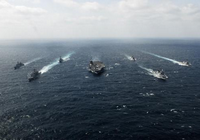
On the surface, the NATO summit meeting in Lisbon, the North Korean artillery barrage against Yeonpyeong island, and the unmasking of the “fake” Mullah Akhtar Muhammad Mansour in Afghanistan would appear to be separate and unconnected events. But there is a common theme that ties these three news stories together. In his WPR column column on Monday, Thomas P.M. Barnett summed up the problem: The United States cannot “close the gaps” in the global security system. The end of the Cold War and the rise of new power centers around the world have not led to any appreciable shift in […]
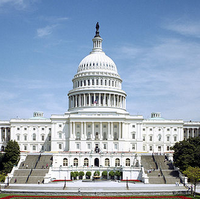
The Convention on the Elimination of All Forms of Discrimination Against Women, or CEDAW, is getting its third shot at ratification after lying dormant in U.S. Senate subcommittees for the past 30 years. With the Obama administration’s support and a Democratic majority in the Senate, the timing for what’s known as the Women’s Treaty could be right. But even in the best of circumstances, CEDAW will still be up against tough odds. “It’s well known world-wide there’s a tremendous amount of obstructionism going on in the U.S., and today, regrettably, this convention is not at the top of the list […]
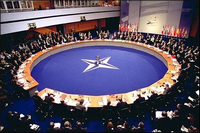
At the NATO heads-of-state summit held in Lisbon this weekend, the leaders of NATO member states resolved some important issues regarding the alliance’s future, but they deferred many key decisions for further deliberation. As a result, much of the summit’s outcome will not be definitively clear for some time. The topic that drew the most media attention this past weekend was how long NATO would continue its military effort in Afghanistan, and whether the alliance could actually win the war within whatever withdrawal timeline its members articulated. NATO leaders confirmed 2014 as the new target date for drawing down their […]

The global financial crisis was a true system perturbation, revealing the gap between widely perceived risk and actual underlying risk in the world’s increasingly integrated financial system. As with any such vertical shock, the resulting horizontal waves continue to be felt long after the initial blow. When gaps in capabilities and rule-sets were subsequently discovered, the world’s major economies effected changes, like shifting economic oversight from the G-7 to the expanded G-20 and updating the Basel banking accord. In a world without true global government, these surges of great-power cooperation constitute a critical reassurance function, letting us know that an […]
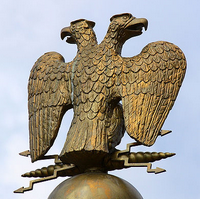
President Barack Obama’s itinerary this month — first to Asia, then to Europe — will follow a path that recalls the setting of the sun. For some people, that image is a metaphor for American power, itself seen as waning. The theme of American decline is a familiar one, of course. It resurfaces more or less with every election, and with every poll that asks whether the country is “headed in the right direction.” However, the evocation of direction suggests a more apt image for Obama’s journey: the two-headed eagle. It was once a common feature of imperial heraldry — […]
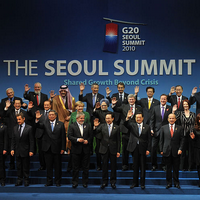
Heading into the G-20 summit in Seoul last week, tensions were visibly high between the U.S. and China, the world’s top-two economies. Washington’s demands that China allow its currency, the yuan, to appreciate were met with criticisms from Beijing about the Fed’s inflationary monetary policy. At the heart of the argument lay global current account imbalances, largely a consequence of the sizeable U.S. trade deficit with China. By the close of the summit, the U.S. delegation succeeded in getting the Chinese to acknowledge that these imbalances were problematic for the global economy, but failed in getting them to do anything […]
I had the pleasure of participating last Friday in France 24’s panel discussion program, The World This Week, along with the IHT’s Eric Pfanner, Newsweek’s Christopher Dickey and the AFP’s David Clarke. The topics were the G-20 summit, Ireland’s debt crisis, the newly formed Iraqi government and George W. Bush’s return to the spotlight. Part one can be found here. Part two can be found here.

By calling the Chinese out explicitly on their currency manipulation in his concluding address to the G-20 summit last week, President Barack Obama may have torpedoed his relationship with Beijing for the remainder of what China’s bosses most certainly now hope is his first and only term. Burdened by a Republican-controlled, Tea Party-infused House, and bathed in hypocrisy thanks to the Fed’s own, just-announced currency manipulation (aka, QE2), Obama seems not to recognize either the gravity of his nation’s long-term economic situation or the degree to which his own political fate now hinges on his administration’s increasingly stormy ties with […]
As the current political narrative has it, President Barack Obama has been weakened by the midterm elections. So it should come as no surprise that his failure to sell Congress’ version of the U.S.-South Korea free trade agreement is a reflection of Obama’s weakened position, rather than, say, a reflection of Congress’ unrealistic expectations of what trade concessions other countries are willing to make in the current dismal economic environment. The same latent theme runs through much of the coverage of Obama’s tepid performance at the G-20 summit, although it is not as pronounced. So be it, narratives are often […]

The New Strategic Arms Reduction Treaty (START) was sent to the Senate for consideration in May 2010, but its outlook is far from clear. To be ratified, the treaty mustachievetwo-thirds majorityapproval. But some treaty provisions, viewed by certain senators as restricting U.S. missile defense objectives, were already an obstacle to ratification six months ago. Even in its current configuration, the U.S. Senate Foreign Relations Committee has demanded elimination of the treaty provisions related to missile defense and certain non-nuclear systems. Given Republican gains in the Senate following the midterm elections, these provisions will face even greater opposition come January. Removing […]
One of my father’s favorite expressions is that character equals destiny. Nowhere did that seem more evident than in the run-up to today’s G-20 summit, which resembled a classical Greek tragedy: The audience sees the obvious resolution to the crisis, but the actors — prisoners of their character, and thus their destiny — plow onward to their fate. So despite the need for a harmonious summit to fend off the gathering currency wars, the U.S. Fed chose last week to announce its quantitative easing policy, promptly denounced by just about all of the U.S. interlocutors at the G-20 forum. But […]
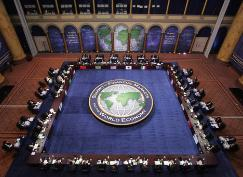
South Korea is set to host the G-20 leaders’ summit in Seoul on Thursday and Friday, the fifth such gathering since the onset of the global financial crisis. While past summits have focused on coordinated stimulus, global financial regulation and reform of the major international financial institutions, this week’s meeting is gearing up to be known as the “trade and currency summit.” It is also likely to be more tense and contentious than any of its predecessors, whether leaders admit it publicly or not. This is especially true when it comes to the ongoing economic prize-fight between the G-20’s two […]
